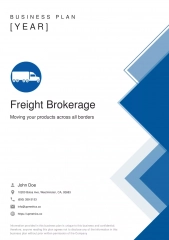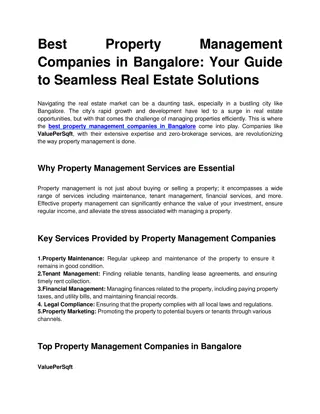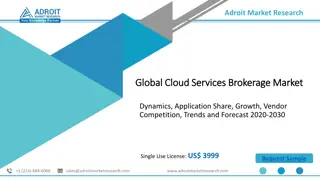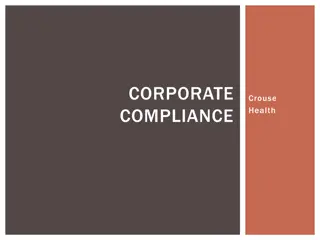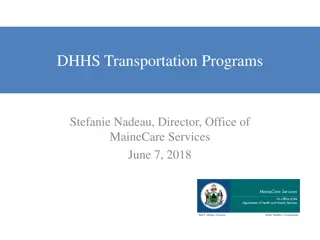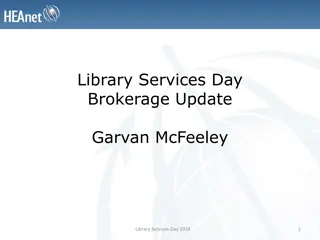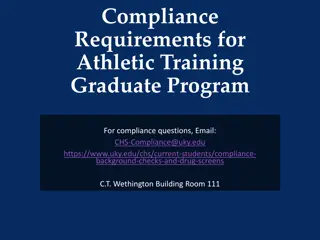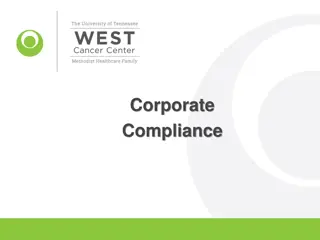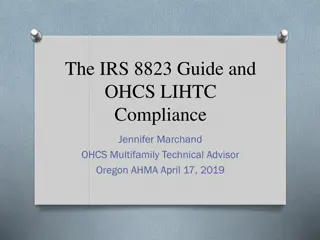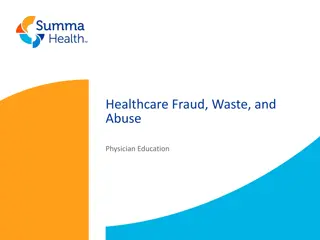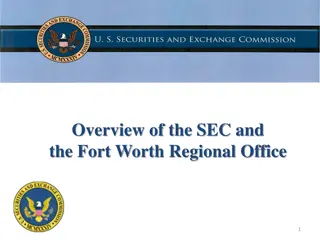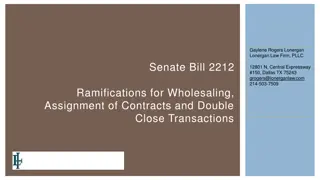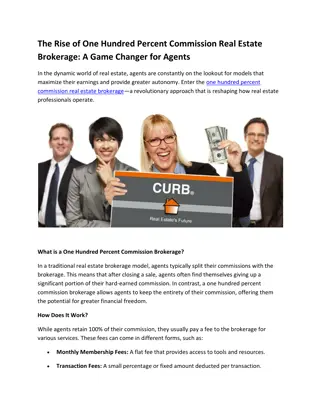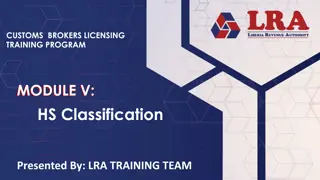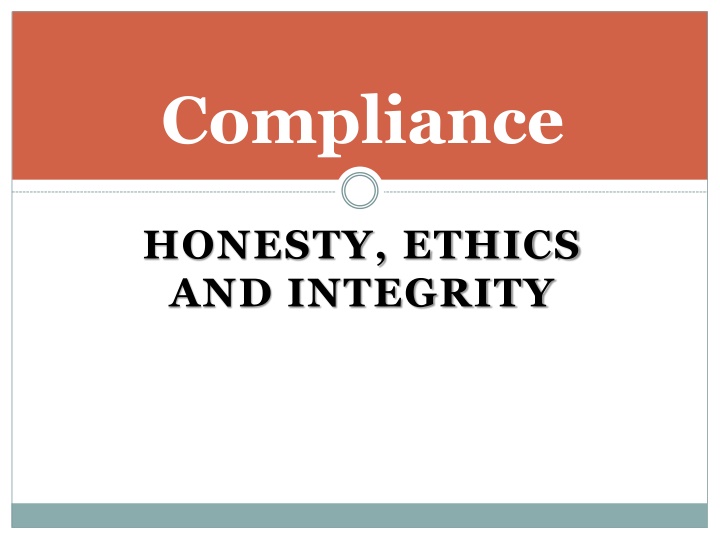
Compliance, Ethics, and Integrity Guidelines for Insurance Agents
Learn about the essential principles of compliance, honesty, ethics, and integrity for insurance agents. Find out the key guidelines regarding conduct, anti-discrimination, misrepresentation, fraudulent signatures, and unlawful inducement to ensure fair and ethical practices in the insurance industry.
Download Presentation

Please find below an Image/Link to download the presentation.
The content on the website is provided AS IS for your information and personal use only. It may not be sold, licensed, or shared on other websites without obtaining consent from the author. If you encounter any issues during the download, it is possible that the publisher has removed the file from their server.
You are allowed to download the files provided on this website for personal or commercial use, subject to the condition that they are used lawfully. All files are the property of their respective owners.
The content on the website is provided AS IS for your information and personal use only. It may not be sold, licensed, or shared on other websites without obtaining consent from the author.
E N D
Presentation Transcript
Compliance HONESTY, ETHICS AND INTEGRITY
Conduct and Ethical Behavior 2
3 You will clearly identify yourself and your relationship with the carrier. Who you are Disclose you are a licensed insurance agent. Never suggest you are an employee of the U.S. government or any carrier.
4 You will not falsely imply that you: Inappropriate Use of Designation Possess special financial knowledge or have obtained specialized financial training; or You will not use terms such as financial advisor to falsely imply that you are licensed or qualified to discuss, sell or recommend financial products other than insurance products.
Anti-Discrimination 5 Discrimination or harassment of any kind is not permitted. Examples of conduct that is not permitted include racial or ethnic comments and sexual advancements. You will always be mindful to act with the highest standards of professionalism and ethics and avoid conduct that may be construed as discrimination or harassment.
Misrepresentation 6 YOU WILL NOT MAKE ANY STATEMENT CONCERNING ANY INSURANCE PRODUCT OR PLAN THAT IS UNTRUE, DECEPTIVE, CONFUSING OR MISLEADING. YOU WILL NOT MAKE A FALSE OR MISLEADING STATEMENT AS TO THE FINANCIAL CONDITION OF ANY CARRIER.
Misrepresentation 7 YOU WILL NOT ENGAGE IN ACTIVITIES THAT COULD CONFUSE CLIENTS OR POTENTIAL CLIENTS. YOU WILL NOT MISREPRESENT CARRIER PARTNERS OR THEIR PRODUCTS OR PLANS.
Fraudulent Signatures 8 YOU WILL NOT SUBMIT TO A CARRIER, ON BEHALF OF A CLIENT, AN APPLICATION OR POLICY- RELATED DOCUMENT BEARING A FALSE OR FRAUDULENT SIGNATURE OR INITIALS. THIS CONDUCT IS ILLEGAL, UNETHICAL AND GROUNDS FOR IMMEDIATE TERMINATION. VIOLATIONS ARE REPORTED TO THE APPROPRIATE LAW ENFORCEMENT AUTHORITY.
Unlawful Inducement 9 EXCEPT AS EXPRESSLY PROVIDED BY LAW, YOU WILL NOT GIVE OR PROVIDE ANYTHING OF VALUE TO A CLIENT WHETHER IT S DIRECTLY OR INDIRECTLY. IN ADDITION TO TANGIBLE ITEMS HAVING VALUE, INDUCEMENTS INCLUDE: SPECIAL FAVORS AND OFFERS TO PAY OR REBATE ANY PORTION OF PREMIUMS OR CHARGES; OR, SHARING OF COMMISSIONS OR BONUSES.
10 You will not use scare tactics, coercion, deception, sympathy appeal, false sense of urgency or other high pressure tactic to cause a client or potential client to enter into any transaction. High Pressure Sales Tactics You will always give clear information and avoid the use of false, misleading or exaggerated statements.
11 You will not use any unapproved marketing materials. Marketing Material All agents must include appropriate content and disclaimers.
12 You will not disparage: Non- Disparagement Insurance companies Competitors or their products or plans Nor shall you make unsubstantiated comparisons or seek to influence the cancellation of any contract that may exist between competitors and their clients.
The Consumer 13
14 You will conduct yourself with courtesy, dignity and with respect for the rights and reasonable requests of clients and potential clients at all times. The Rights and Best Interest of the Client You must understand and observe insurance laws to its fullest by presenting accurately and completely, every essential fact to a client s decision and always placing the client s best interest first.
15 You will ensure that all information on any application is completely filled in by the client or their legal representative, or you at the direction of the client or their legal representative. Duty to Verify You will never sign any application on behalf of any client even if directed by the client to do so. You will verify all of the information on the application is correct and confirm the client s understanding of the pending enrollment.
16 Prior to recommending any product, you will first make reasonable efforts to obtain information concerning the client s objectives, needs, financial and/or health status, as applicable, to evaluate the suitability of the recommendation. Ensure Suitability You will objectively consider all information provided by the client to ensure the transaction is suitable.
17 If you believe that the consumer does not have the mental capacity to understand the information you are presenting, probe to determine if there is someone that assists with their healthcare decisions. Cognitive Ability If yes, then re-schedule an appointment to meet with the decision maker.
18 If there is an active power of attorney for healthcare, ask to see the document and include with the carrier application, if possible. The designee must sign all of the enrollment paperwork. Cognitive Ability If there is no one that assists the consumer, and they do not understand policy guidelines, health plan restrictions or the financial consequences of the application, Walk away from the sale !
Unsolicited Contact 19 UNSOLICITED CONTACT OF MEDICARE BENEFICIARIES FOR THE PURPOSE OF MARKETING A MEDICARE ADVANTAGE PRODUCT IS STRICTLY PROHIBITED. YOU WILL NOT ENGAGE IN ANY DOOR-TO- DOOR MARKETING OR SALES ACTIVITY RELATING TO ALL TYPES OF MEDICARE ADVANTAGE PLANS.
20 Enrollments in a Medicare Advantage plan will not be predicated on age or medical condition, except as provided by federal rules pertaining to access in Medicare. Impermissible Selective Health Marketing You will never engage in selective marketing based on health or a health screening. You will not discriminate against any person based on health status or disability. You will ensure that all marketing materials and sales meetings are accessible to the disabled.
21 While marketing Medicare Advantage products, you will ensure that all CMS and carrier regulations regarding the scope of appointment are strictly followed, including the mandatory 48-hour wait period prior to discussion and recommendation of a specific plan. Scope of Appointment In every instance, you will ensure that the products discussed are those for which the client provided the appropriate advanced consent.
22 You will be mindful and understand CMS marketing guidelines relating to the use of prohibited words and phrases. CMS Guidelines on Terminology and Prohibited Words and Phrases You will never use the word free while marketing any insurance product or plan. You will avoid the use of absolute superlatives during any Medicare Advantage presentation.
Summary of Benefits 23 DURING EVERY MEDICARE ADVANTAGE PRESENTATION, YOU WILL TAKE STEPS TO FULLY EXPLAIN THE PLAN S SUMMARY OF BENEFITS AND THE CARRIER S PLAN RATING. AND YOU MUST PROVIDE THE BENEFICIARY WITH A COPY OF THE SUMMARY OF BENEFITS, PLAN RATINGS AND THE MULTI-LANGUAGE INSERT.
Referrals 24 IN CONNECTION WITH MEDICARE ADVANTAGE PRODUCTS, YOU WILL NOT MAKE DIRECT INITIAL CONTACT WITH ANY PERSON REFERRED TO YOU BY A CLIENT. YOU MAY ASK THE CLIENT TO PROVIDE YOUR CONTACT INFORMATION (BUSINESS CARD) TO THAT PERSON AND HAVE HIM/ HER INITIATE THE CONTACT.
Business Entertainment and Gifts 26 THE PURPOSE OF BUSINESS ENTERTAINMENT AND GIFTS IN A COMMERCIAL SETTING IS TO CREATE GOODWILL AND SOUND WORKING RELATIONSHIPS, NOT TO GAIN UNFAIR ADVANTAGE WITH CUSTOMERS.
Business Entertainment and Gifts 27 1) is not a cash gift, 2) is consistent with customary business practices, No gift or entertainment should ever be offered, given, provided or accepted by any agent, or family member of an agent, unless it: 3) is not excessive in value, 4) cannot be construed as a bribe or payoff, and 5) does not violate any laws or regulations.
29 We all must maintain the confidentiality of information entrusted to us, except when disclosure is authorized by the Company s Legal Department or required by laws or regulations. Maintaining Confidentiality Confidential information includes all non- public or proprietary information that might be of use to competitors or harmful to the company or our customers, if disclosed. It also includes information that suppliers and customers have entrusted to us.
30 Sensitive client information may include, but is not limited to: Sensitive Information Client account numbers Policy numbers Financial information Medical information Social Security numbers Medicare ID numbers
Personal Information 31 WITH RESPECT TO HEALTH INSURANCE BUSINESS, INCLUDING MEDICARE SUPPLEMENT INSURANCE, MEDICARE ADVANTAGE AND HOSPITAL INDEMNITY BUSINESS, THE FEDERAL HEALTH INSURANCE PORTABILITY AND ACCOUNTABILITY ACT ( HIPAA ), ALONG WITH ITS AMENDMENTS AND RELATED REGULATIONS, GOVERN OUR USE AND DISCLOSURE OF CLIENT INFORMATION.
32 HIPAA-protected data includes Protected Health Information ( PHI ) relating to our clients. HIPAA includes a broad definition of PHI. A photocopy of a completed application for insurance (Medicare Advantage application, Medicare Supplement, Hospital Indemnity Plan, etc.) is considered PHI. Protected Health Information (PHI) PHI does not only refer just to information on specific health conditions or treatment records. Any identifying data that is associated with a client can be considered PHI.
33 Protected Health Information may only be used or disclosed for permitted purposes to serve the client s interests, and only in accordance with applicable privacy policies, carrier agreements, the provisions of HIPAA, and any other state or federal law. Protected Health Information (PHI)
Protected Health Information (PHI) 34 You are required: To not use or disclose the Protected Information other than as permitted or required in connection with your job duties or as otherwise required by law, and To use appropriate safeguards to prevent use or disclosure of the Protected Information by unauthorized persons
35 Such safeguards include, but are not limited to: Storing Protected Information in a secured area Safeguards Not leaving Protected Information unattended Not using traditional E-mail as a method of transmitting Protected Information.
Encryption 36 IN THE HEALTH CARE AND FINANCIAL SERVICES INDUSTRY, WHEN SENSITIVE INFORMATION MUST BE SENT VIA EMAIL, THE EMAIL MUST BE ENCRYPTED. YOU MAY HAVE ENCOUNTERED A SECURE, ENCRYPTED EMAIL BEFORE IF YOU EVER RECEIVED AN EMAIL WHERE YOU WERE REQUIRED TO ENTER A USER ID AND PASSWORD BEFORE BEING ABLE TO VIEW THE EMAIL.
37 When it is absolutely necessary for you to transmit sensitive data, you have several options: Transmitting Sensitive Data By secure/encrypted email By facsimile By overnight courier with tracking
38 If you use a mobile device or tablet to access and view confidential or sensitive information or PHI, you must use safeguards to ensure confidentiality of data. Mobile Devices and Tablets Auto-lock features with passcode protection must always be utilized.
Reporting a Violation 39 YOU MUST IMMEDIATELY REPORT TO THE COMPANY S HIPAA PRIVACY OFFICER, ANY USE OR DISCLOSURE OF THE PROTECTED INFORMATION THAT YOU BELIEVE MAY HAVE BEEN IN VIOLATION OF THE COMPANY SPRIVACY POLICY, ANY AGREEMENT WITH AN INSURANCE CARRIER (INCLUDING A BUSINESS ASSOCIATE AGREEMENT), OR STATE OR FEDERAL LAW.
Anonymous Reporting 40 ANONYMOUS REPORTING MAY BE MADE THROUGH THE TOLL-FREE HOTLINE PROVIDED BY THE COMPANY S THIRD PARTY HOTLINE SERVICE: TAYLOR WHITE ACCOUNTING AND FINANCE (888) 368-7988.
Thank You 41
42 F O R A G E N T U S E O N L Y . N O T F O R U S E W I T H C O N S U M E R S . C E R T A I N E X C L U S I O N S A N D L I M I T A T I O N S M A Y A P P L Y . N O T A F F I L I A T E D W I T H T H E U N I T E D S T A T E S G O V E R N M E N T O R T H E F E D E R A L M E D I C A R E P R O G R A M . T H E C O N T E N T O F T H I S P R E S E N T A T I O N R E F L E C T S T H E O P I N I O N O F T H E P R E S E N T E R A N D N O T N E C E S S A R I L Y T H E O P I N I O N O F A N Y E N T I T Y W I T H W H I C H T H E P R E S E N T E R H A S A B U S I N E S S R E L A T I O N S H I P . T H I S I N F O R M A T I O N I S P R O V I D E D F O R E D U C A T I O N A L P U R P O S E S . T H E O N G O I N G I M P L E M E N T A T I O N O F L A W S , R U L E S , A N D R E G U L A T I O N S M A Y C A L L F O R I N F O R M A T I O N I N T H I S P R E S E N T A T I O N T O B E R E V I S E D . N E I T H E R T H E P R E S E N T E R , N O R A N Y E N T I T Y W I T H W H I C H T H E P R E S E N T E R M A Y B E A F F I L I A T E D , C O N T R A C T E D , O R E M P L O Y E D , P R O V I D E T A X , I N V E S T M E N T , O R L E G A L A D V I C E .


